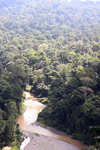FEATURED ARTICLES [Latest news updates]
Photos from Malaysia
Earlier this month I visited Sabah in Malaysian Borneo. Pictures from the trip have been added to the Malaysia section of the photo site.
[
Malaysia]
No sacrifices to ending deforestation in the Amazon, only gains:
An interview with Brazilian journalist Sergio Abranches
(04/29/2008) Regular columnist and co-creator of Brazil's environmental news website, O Eco, Sergio Abranches has great credibility in Brazil's eco-awakening. A professor of political science, Abranches uses his unique talents to reach a widening audience in Brazil for environmental, energy, and climate change news and discussion. He speaks expertly on any number of topics: from Amazonian deforestation to the current food crises to economic and political transformations for a warming world. Calling himself an "activist of ideas", Sergio Abranches spoke to Mongabay on many issues, including the current state of the Amazon.
[
Amazon | Brazil | Interviews]
Peru fails to investigate murder of Amazon environmental leader

|
|
(04/22/2008) Peruvian authorities failed to respond to requests for protection from Julio Garcia Agapito, the environmental leader who was gunned down in southeastern Peru in late February, according to a new petition which calls for an investigation into his murder. Julio Garcia's killing at the hands of an illegal logger set off international outcry and highlighted rising tensions over the paving of a highway in the Amazon rainforest.
[
Amazon | Peru]
How you can help save rainforests
(04/22/2008) A guest post on thefind.com: Most people understand that tropical rainforests are critically important in regulating rainfall and global climate, while providing habitat for millions of species and unique indigenous cultures. Yet despite this significance, rainforests continue to be destroyed at a furious pace -- in 2008 Brazil and Indonesia are expected to each lose at least 8 million acres of forest cover. Is there anything an individual can do to help save the majestic forests of the Amazon, the Congo, and Southeast Asia? Thankfully, there is. Here is a look at some small actions that can help tropical forests.
[
Rainforests]
An interview with Simon Counsell, Director of Rainforest Foundation UK:
The FSC is the 'Enron of forestry' says rainforest activist

|
|
(04/17/2008) On April 7th, Mongabay printed an interview with FSC International Communications Manager, Nina Haase, in which she defended the FSC against criticism leveled at it by various environmental organizations, such as The World Rainforest Movement and Ecological Internet. The interview drew strong reactions on both sides, and Simon Counsell, director of the Rainforest Foundation UK, requested a chance to respond to the FSC's interview in-depth. In his response, he states that the FSC has created a "'race to the bottom' of certification standards", alleging that the "FSC really has become the 'Enron of forestry'"
[
Logging | Forestry | Certification]
Palm oil boycott an unrealistic approach to conserving biodiversity
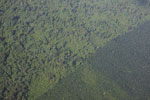
|
|
(04/15/2008) Boycotting palm oil produced in Southeast Asia in an "unrealistic" and "ineffective" approach to conserving the region's fast-disappearing rainforests, said a Princeton University researcher speaking at a conference on the sustainability of palm oil. Instead, NGOs should focus on engaging and working with the palm oil industry to reduce its impact on the environment. Addressing the first International Palm Oil Sustainability Conference in Kota Kinabalu, Malaysia, Princeton biologist Dr. David S. Wilcove said that the palm oil industry is too important to the economies of Indonesia and Malaysia to justify blanket import bans on the edible oil used in food, cosmetics, industrial products, and biodiesel. The palm oil industry contributes to health, education, and infrastructure in rural areas.
[
Borneo | Mining | Happy-upbeat environmental]
Saving the world's most recently discovered cat species:
An interview with Andy Hearn and Jo Ross, Borneo wild cat researchers
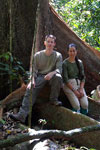
|
|
(04/10/2008) Last year two teams of scientists announced the discovery of a new species of clouded leopard in Borneo. The news came as conservationists launched a major initiative to conserve a large area of forest on an island where logging and oil palm plantations have consumed vast expanses of highly biodiverse tropical rainforest over the past thirty years. Now a pair of researchers are racing against the clock to better understand the behavior of these rare cats to see how well they adapt to these changes in and around Danum Valley in Malaysia's Sabah state. Andrew Hearn and Joanna Ross run the Bornean Wild Cat and Clouded Leopard Project, an effort that aims to understand and protect Borneo's threatened wild cats. Today mongabay.com caught up with Hearn and Ross at the Danum Valley Field Center in Borneo.
[
Borneo | Rainforests | Interviews | Wildlife]
The FSC responds to its critics
An interview with Nina Haase, FSC International Communications Manager

|
|
(04/07/2008) Last month, Mongabay.com reported on recent and various criticisms of the FSC (the Forest Stewardship Council). The FSC is an international organization that certifies forest products which, according to their standards, have been harvested in an environmentally-sustainable and socially-responsible manner. Response to the article was significant. It was picked up by the Ecological Internet's email campaign and was mentioned on numerous environmental web sites and blogs. At the time of the publication, the FSC had not responded to requests for comments. But in the following interview, FSC International Communications Manager Nina Haase answers each criticism separately and addresses several other issues, such as the FSC and climate change, the organization's monitoring capabilities, and its adaptation to new environmental concerns. Ultimately she responds to the big question raised by critics: is the FSC stamp still credible?
[
Logging | Interviews]
Land invasions undermine Amazon forest law
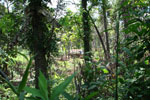
|
|
(04/03/2008) Land invasions are undermining a Brazilian law that requires ranchers to keep 80 percent of their land forested, according to reports from the Amazon state of Mato Grosso. A run up in land prices, driven by surging soy and cattle production in the region, combined with a lackadaisical response from law enforcement authorities are blamed for the incursions.
[
Amazon | Brazil | Deforestation]
Investing to save rainforests:
An interview with Hylton Murray-Philipson of Canopy Capital

|
|
(04/02/2008) Last week London-based Canopy Capital, a private equity firm, announced a historic deal to preserve the rainforest of Iwokrama, a 371,000-hectare reserve in the South American country of Guyana. In exchange for funding a "significant" part of Iwokrama's $1.2 million research and conservation program on an ongoing basis, Canopy Capital secured the right to develop value for environmental services provided by the reserve. Hylton Murray-Philipson, director of Canopy Capital, says the agreement — which returns 80 percent of the proceeds to the people of Guyana — could set the stage for an era where forest conservation is driven by the pursuit of profit rather than overt altruistic concerns.
[
Ecosystem services | Rainforests | Interviews | Guyana]
Could felling and burying trees help fight global warming?
(04/30/2008) Could cutting down trees and burying them help fight global warming? An article in this week's issue of New Scientist suggests so.
[
Carbon sequestration | Terra preta]
Global warming could worsen HIV/AIDS epidemic
(04/30/2008) A number of studies have suggested that climate change could expand the range of tropical diseases like Dengue fever and Encephalitis. Now a researcher from the University of New South Wales (UNSW) in Australia says that global warming could lead to an increase in HIV infection rates worldwide.
[
Impact of climate change | Health]
New species of river dolphin discovered in the Amazon
(04/30/2008) Researchers have identified a new species of river dolphin in the Bolivian Amazon according to the Whale and Dolphin Conservation Society (WDCS). The announcement was made at a conservation workshop in Santa Cruz de la Sierra in Bolivia.
[
Amazon | Brazil | Species discovery]
Judge suspends Amazon dam project due to legal questions
(04/30/2008) A Brazilian judge has issued a restraining order on a controversial dam in the Amazon basin, reports International Rivers, a conservation group.
[
Amazon | Brazil | Dams]
14 unknown species discovered in Brazil's cerrado

|
|
(04/29/2008) An expedition to Brazil's Cerrado has turned up more than a dozen undiscovered species. Conservationists say the discoveries add urgency to protecting the grassland habitat which is rapidly being converted for agriculture. The research team, which included scientists from Conservation International (CI) and Brazilian universities, found 14 species believed new to science — including eight fish, three reptiles, one amphibian, one mammal, and one bird — in and around the Serra Geral do Tocantins Ecological Station, a 716,000-hectare (1,769,274-acre) protected area.
[
Amazon | Brazil | Cerrado | Species discovery]
Biodiversity key to fighting climate change
(04/29/2008) Scientists from Brown University have discovered that an ecosystem's productivity is directly linked to its diversity of plant species. The discovery has granted biodiversity new importance in the fight against climate change: the more productive the ecosystem the more carbon it captures.
[
Biodiversity | Ecosystem services]
'Soy King' says Amazon deforestation could help solve global food crisis
(04/28/2008) Clearing the Amazon rainforest for soy farms will help address the global food crisis, said Blairo Maggi, the governor of Brazil's chief soy-producing state, according to the Folha de Sao Paulo newspaper.
[
Amazon | Brazil]
Fast-food industry destroying forests in the Southern U.S

|
|
(04/28/2008) The Southern forests of North America supply 60% of US and 15% of global paper demands. Deforestation for wood and paper products, along with urban sprawl, has resulted in a total decline from 356 million acres in colonial times to 182 million acres today. The South contains more threatened forest ecosystems than anywhere else in the US. A major perpetuator of deforestation in the South is the fast food industry. With nearly 100 paper packaging mills in the South and thousands of restaurants worldwide, major fast food retailers such as KFC and Taco Bell are leaders in paper consumption and subsequent waste. The Dogwood Alliance, a nonprofit organization formed to increase awareness of the importance of Southern forests and the threats their survival, has launched a new campaign at nofreerefills.org which specifically targets the paper packaging practices of the fast food industry.
[
Forests]
Brazil prepares to crackdown on foreign NGOs in the Amazon
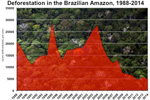
|
|
(04/28/2008) Brazil is planning a crackdown on foreign NGOs working in the Amazon rainforest, reports Reuters. Tourists may also be required to inform officials of their travel plans in the region under the newly proposed rule. Claiming concerns over "sovereignty" and "biopiracy", Justice Minister Tarso Genro told the media Wednesday that NGOs would have to get permissions from the Justice Ministry and register with the military if they wanted to operate in the region. Foreign visitors -- including tourists according to Brazil's National Justice Secretary Romeu Tuma -- would be required to also get special permits for the Amazon.
[
Amazon | Brazil]
The Arctic's most threatened marine mammals due to climate change

|
|
(04/25/2008) A recent study has measured the sensitivity to Arctic marine mammals to climate change. The study found that the three species most vulnerable to climate change are the hooded seal, the polar bear, and the narwhal: the common thread between these species being the loss of sea ice.
[
Biodiversity | Greenland-Arctic | Marine Conservation | Oceans]
Geoengineering solution to global warming could destroy the ozone layer
(04/24/2008) A proposed plan to fight global warming by injecting sulfate particles into Earth's upper atmosphere could damage the ozone layer over the Arctic and Antarctic, report researchers writing in the journal Science.
[
Geoengineering | Ozone layer]
New cures for human ailments under threat by global extinction crisis
(04/24/2008) In the film Medicine Man, a researcher in the Amazon discovers a cure for cancer in a rare ant. However, a logging company arrives at the wrong moment and, despite protestations from the main characters, the company destroys the tract of rainforest where the ant once survived. A new book Sustaining Life: How Human Life Depends on Biodiversity proves that the 1992 film isn't far off the track. The new book is the largest text yet regarding the possible cures that have already been lost—and those that we are losing due to the globe's increasing loss of biodiversity. The book includes writing from over one-hundred scientists, including an introduction by E.O. Wilson and a prologue by Kofi Annan.
[
Biodiversity | Extinction]
Shark-repelling fishing gear in the works
(04/23/2008) Fishing gear that produces an electric field in sea water could help prevent sharks from becoming accidental bycatch, say scientists at NOAA.
[
Sharks]
Fruit-eating bats ingest dirt to counter toxic plant compounds
(04/23/2008) Pregnant and lactating frugivorous bats ingest dirt in order to detoxify plant compounds in the fruit they eat, report researchers writing in the journal PLoS ONE.
[
Animal behavior]
Carbon dioxide, methane levels rise sharply in 2007
(04/23/2008) Atmospheric concentrations of carbon dioxide and methane — potent greenhouse gases — rose sharply in 2007, according to NOAA.
[
Carbon dioxide]
PETA offers $1M for lab-grown meat
(04/23/2008) Animal rights' group People for the Ethical Treatment of Animals (PETA) has offered $1 million to the first scientist who can create lab-grown meat in quantities large enough to be sold commercially and is indistinguishable in taste from the real thing.
[
Environment]
Rainforest recovery after deforestation can be enhanced by artificial bat houses
(04/23/2008) "Bat boxes" could help in the recovery of tropical rainforest after deforestation, reports research described in New Scientist Magazine.
[
Bats | Happy-Upbeat Environmental]
Happy Earth Day to the nomadic Turkana of Northern Kenya
(04/22/2008) With the Earth Day apparently becoming another commercial holiday to sell us more stuff we don't need, I've decided to re-post an article from February about the nomadic Turkana in Northern Kenya. While I haven't been to the region since October 2007, I suspect that vast majority of Turkana are not celebrating Earth Day and are in fact more concerned about rising food prices and continued deterioration of their already marginal existence. For traditionalists, here's an article I wrote for Earth Day 2005.
[
Kenya | Featured]
A billion trees to be planted in Brazil's Atlantic Forest over the next 7 years

|
|
(04/22/2008) Rare and previously undiscovered species are under threat by loggers, ranchers, and poachers in an isolated patch of cloud forest in Panama, a prominent group of scientists has warned. The group, the Association for Tropical Biology and Conservation (ATBC), has called on the Panamanian government to immediately provide protected-area status to the region.
[
Panama]
Unilever admits it can't trace origin of palm oil used in its products
(04/21/2008) Unilever has admitted to Greenpeace that it can't trace the origin of palm oil supplied by firms operating in Indonesia. The revelation suggests that efforts to improve the sustainability of Indonesian palm oil have stalled as large tracts of rainforest continue to fall for the establishment of new oil palm plantations on the islands of Borneo, New Guinea, and Sumatra..
[
Borneo | Palm oil]
Cache of rare and undiscovered species under threat in Panama

|
|
(04/21/2008) Rare and previously undiscovered species are under threat by loggers, ranchers, and poachers in an isolated patch of cloud forest in Panama, a prominent group of scientists has warned. The group, the Association for Tropical Biology and Conservation (ATBC), has called on the Panamanian government to immediately provide protected-area status to the region.
[
Panama]
Mongabay recognized by TIME [external]
(04/18/2008) Mongabay has been included among TIME's top 15 climate and environment Web sites.
[
TIME.com]
World's rarest gorilla gets its own forest reserve
(04/18/2008) The government of Cameroon has established the first sanctuary exclusively for the world's rarest type of ape: the Cross River gorilla, according to the Wildlife Conservation Society (WCS), which helped support the project.
[
Cameroon | Gorillas | Happy-upbeat Environmental]
Borneo's elephants are an alien species
(04/18/2008) A new study suggests that the Borneo pygmy elephant — one of Borneo's best known and charismatic animals — is actually an invasive species introduced from a neighboring island by a former sultan. The finding offers hope that in Borneo, the elephant can avoid the fate that befell it in its native Java: extinction.
[
Borneo | Elephants]
Malaysian palm oil industry puts sustainability in the spotlight

|
|
(04/17/2008) Seeking to differentiate its palm oil from that produced less responsibly in other countries, the Malaysian Palm Oil Council (MPOC) sponsored a three-day meeting this week in Kota Kinabalu, on the island of Borneo. The International Palm Oil Sustainability Conference (IPOSC) aimed to promote the virtues of palm oil and address environmental concerns that many green groups say plague the industry.
[
Palm oil | Malaysia]
Photos by late Borneo rainforest hero, indigenous rights activist go online

|
|
(04/17/2008) On April 19th over 10,000 of Bruno Manser's photographs will be made available to the public on-line. The pictures are rare documentation of the nomadic Penan peoples from the Malaysian state of Sarawak in Borneo. Swiss environmentalist Bruno Manser proved an unflinching and passionate advocate for the Penans in the 1990s as their territory was increasingly deforested by industrial logging companies.
[
Borneo | Malaysia | Indigenous people | Rainforests]
Environment is the number one issue for Australians
(04/17/2008) Seeking to differentiate its palm oil from that produced less responsibly in other countries, the Malaysian Palm Oil Council (MPOC) sponsored a three-day meeting this week in Kota Kinabalu, on the island of Borneo. The International Palm Oil Sustainability Conference (IPOSC) aimed to promote the virtues of palm oil and address environmental concerns that many green groups say plague the industry.
[
Australia]
New expedition seeks evidence for survival of the 'extinct' Baiji
(04/16/2008) The EDGE program, apart of the London Zoological Society, has sent an expedition to the Yangtze River to survey local fishermen for any evidence that the Baiji may still survive.
[
Extinction]
Mobile game to help save embattled gorillas in the Congo
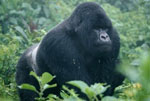
|
|
(04/16/2008) For mobile users a new mobile game hopes to raise awareness of the plight of the mountain gorilla and funds for their conservation. Silverback takes gamers through eight levels, following the life-span of a gorilla from childhood to adult. The game was originally developed in 2003 by Fauna & Flora International. Ken Banks, creator of www.kiwanja.net, helped develop the game. In 2006 the game was taken off-line where as Banks says it "sat on a virtual shelf, gathering virtual dust". He has now brought the game back in the hope that it will renew interest, and awareness, in the plight of the mountain gorilla.
[
Technology | Gorillas]
Malaysia rejects coal project in Borneo rainforest
(04/14/2008) Malaysia has rejected a $408 million coal-fired power plant near a protected rainforest area in Sabah, on the island of Borneo.
[
Borneo | Mining | Happy-upbeat environmental]
Indigenous peoples of Congo map their forests with GPS in an effort to save them
(04/13/2008) This week over five hundred villagers in the Democratic Republic of Congo's rainforest will employ GPS technology to map their forests in an effort to preserve their territory from logging companies.
[
Congo | Technology]
Lungless frog discovered in Borneo
(04/11/2008) A lungless frog has been discovered on the island of Borneo. Scientists say the species may shed light on the process of evolution in some organisms.
[
Borneo | Species Discovery]
New map sets conservation priorities for Madagascar
(04/10/2008) Compiling data on thousands of endemic species of ants, butterflies, frogs, geckos, lemurs and plants, an international team of researchers has developed a comprehensive biodiversity map of Madagascar that will help determine determine future reserve placement and conservation planning on the Indian Ocean island and beyond.
[
Madagascar | Conservation]
Poll: Chinese more concerned about the environment than Americans credits
(04/07/2008) A poll released today found that 10.2 percent of the Chinese population lists environmental concerns as the nation's number one issue. It is the fourth highest concern among the Chinese after health care, employment, and the income-gap. According to the poll, the Chinese view the environment as higher than corruption, social security, housing prices, and the cost of education.
[
Greening of China]
Rainforest peoples form alliance to demand payments for forest carbon credits
(04/07/2008) Rainforest peoples from 11 nations have formed a coalition to demand a greater say in future climate negotiations.
[
Indigenous people | REDD]
Wal-Mart pushes for greener manufacturing in China.
(04/07/2008) Wal-Mart, the world's largest retailer, will hold a meeting of around 1,000 of its Chinese suppliers in an effort to reduce its environmental impact, said Lee Scott, Wal-Mart's CEO, in an interview with the Financial Times.
[
China | Sustainability]
Newly discovered fish species has human-like eyes

|
|
(04/04/2008) Dr. Ted Pietsch says that a new species of anglerfish found in Indonesian waters has eyes unlike any he has seen in 40 years studying marine life. Instead of the usual lateral placement of eyes (i.e. on the sides of the head) this fish's eyes are placed at the front of its head. The frontally placed eyes may allow the new species to have binocular vision and improved depth perception, much like terrestrial predators, such as dogs, cats, and humans.
[
Fish | Species discovery]
Ocean dead zones have nearly quadrupled since 1994

|
|
(04/03/2008) Coastal areas worldwide are suffering from over-enrichment of their waters by nitrogen and phosphorus, finds a new study from the World Resources Institute (WRI). This over-enrichment, known as eutrophication, causes numerous environmental problems, eventually devastating coastal environments. In overly nutrient-rich waters phytoplankton, micro- and macroalgae grow to excessive portions; these 'algal blooms' diminish subaquatic vegetation, damage coral reefs, and deplete populations of fish, shellfish, marine mammals, and sea birds. In the worst case scenarios the massive algal blooms form hypoxic or dead zones due to loss of oxygen in the water, essentially condemning the ecosystem.
[
Pollution | Oceans]
Bats eat as many insects as birds
(04/03/2008) Bats eat as many insects at night as birds do during the day, according to research published in the journal Science.
[
Animal behavior | Bats | Ecosystem services]
Amazon soy ban seems to be effective in reducing explicit deforestation
(04/03/2008) An industry-led ban on soy production in the Amazon appears to be proving effective at reducing new clearing for explicit soy production, according to a survey published Monday by Greenpeace and the Brazilian Vegetable Oils Industry Association. The moratorium, which was signed by some of the largest soy crushers in the Amazon in response to a campaign by environmental group Greenpeace, went into effect in October 2006.
[
Amazon | Brazil | Deforestation | Soy]
Global warming solutions are hurting indigenous people, says U.N.

|
|
(04/03/2008) Large-scale solutions intended to help mitigate global warming are harming the very indigenous people who are likely to bear the brunt of climate change, warned the United Nations University (UNU) at a conference in Darwin, Australia. Biofuel plantations, renewable energy projects like hydroelectric dams, and measures to protect forests as carbon sinks threaten to undermine rights of indigenous groups. Such initiatives boost the value of land and increase the likelihood that indigenous people will be displaced.
[
Indigenous people | Biofuels | Forests | Global warming mitigation]
First wolves killed in Wyoming after species loses ESA protection

|
|
(04/02/2008) In one of a series of controversial decisions regarding the Endangered Species Act recently, the federal government has dropped the Rocky Mountain grey wolf from the program. The announcement of the de-listing was made in mid-February, but did not go into effect until Friday when the reins of control were handed over from the federal government to the individual states. Over the weekend wolf-hunting began in Wyoming.
[
Animals | Wildlife | United States]
Monarch butterfly migration threatened by illegal logging in Mexico
(04/02/2008) By 2025 more than half of countries will face freshwater stress or shortages and by 2050 as much as 75 percent of the world's population could face freshwater scarcity, but policy measures and new technologies could help reduce the shortfall, report researchers writing in the journal Nature.
[
Deforestation | Mexico]
75% of world population to face water shortages by 2050
(04/02/2008) By 2025 more than half of countries will face freshwater stress or shortages and by 2050 as much as 75 percent of the world's population could face freshwater scarcity, but policy measures and new technologies could help reduce the shortfall, report researchers writing in the journal Nature.
[
Water]
Most popular news articles for March
(04/01/2008) The most popular mongabay.com news articles for the month of March.
[
Most popular]
The Clean Energy Scam [external]
(04/01/2008) Time Magazine has an excellent feature on the impact of biofuels on the Amazon rainforest. John Cain Carter, a rancher pushing for environmental certification in the region, figures prominently as does Dr. Daniel Nepstad, a researcher with the Woods Hole Research Center who has done several interviews with mongabay.com.
[
Time Magazine]
Invasive species cost China $14B per year
(04/01/2008) Rapid economic growth and giant infrastructure projects have allowed invasive species to spread throughout China and inflict more than $14.5 billion of damage to the nation's economy annually, according to a study published in Bioscience. The research warns that the Beijing Olympics may worsen the toll.
[
Extinction]


